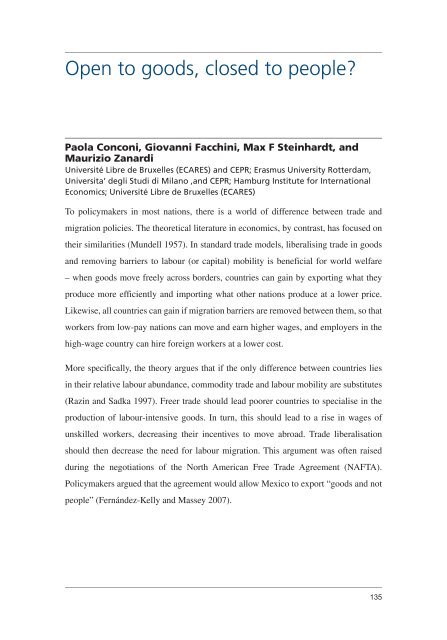- Page 1:
Rethinking Global EconomicGovernanc
- Page 5 and 6:
Centre for Economic Policy Research
- Page 7 and 8:
How to prevent and better handle th
- Page 12 and 13:
IntroductionThe PEGGED Research Pro
- Page 14 and 15:
Introductionsay that the Eurozone c
- Page 16 and 17:
IntroductionGlobalisation, financia
- Page 18 and 19:
Introductionrather than disentangli
- Page 20 and 21:
Introductionbase in one connect the
- Page 22 and 23:
Introductiondraconian immigration r
- Page 24:
IntroductionAbout the authorsRichar
- Page 27 and 28:
Rethinking Global Economic Governan
- Page 29 and 30:
Rethinking Global Economic Governan
- Page 31 and 32:
Rethinking Global Economic Governan
- Page 33 and 34:
Rethinking Global Economic Governan
- Page 36 and 37:
Fiscal consolidation andmacroeconom
- Page 38 and 39:
Fiscal consolidation and macroecono
- Page 40 and 41:
Fiscal consolidation and macroecono
- Page 42 and 43:
Fiscal consolidation and macroecono
- Page 44 and 45:
The Eurozone crisis - April 2012Ric
- Page 46 and 47:
The Eurozone crisis - April 2012is
- Page 48 and 49:
The Eurozone crisis - April 2012Com
- Page 50 and 51:
The Eurozone crisis - April 2012The
- Page 52 and 53:
The Eurozone crisis - April 2012ind
- Page 54 and 55:
The Eurozone crisis - April 2012not
- Page 56 and 57:
The Triffin Dilemma and a multipola
- Page 58:
The Triffin Dilemma and a multipola
- Page 61 and 62:
Rethinking Global Economic Governan
- Page 63 and 64:
Rethinking Global Economic Governan
- Page 66 and 67:
Financial stability: Where it went
- Page 68 and 69:
Financial stability: Where it went
- Page 71 and 72:
Rethinking Global Economic Governan
- Page 73 and 74:
Rethinking Global Economic Governan
- Page 75 and 76:
Rethinking Global Economic Governan
- Page 77 and 78:
Rethinking Global Economic Governan
- Page 79 and 80:
Rethinking Global Economic Governan
- Page 81 and 82:
Rethinking Global Economic Governan
- Page 84 and 85:
How to prevent and better handlethe
- Page 86 and 87:
Failures of global systemically imp
- Page 88 and 89:
Failures of global systemically imp
- Page 90 and 91:
Failures of global systemically imp
- Page 92: Failures of global systemically imp
- Page 95 and 96: Rethinking Global Economic Governan
- Page 97 and 98: Rethinking Global Economic Governan
- Page 99 and 100: Rethinking Global Economic Governan
- Page 101 and 102: Rethinking Global Economic Governan
- Page 103 and 104: Rethinking Global Economic Governan
- Page 105 and 106: Rethinking Global Economic Governan
- Page 107 and 108: Rethinking Global Economic Governan
- Page 109 and 110: Rethinking Global Economic Governan
- Page 111 and 112: Rethinking Global Economic Governan
- Page 113 and 114: Rethinking Global Economic Governan
- Page 116 and 117: Global banks, fiscal policy andinte
- Page 118 and 119: Global bBanks, fiscal policy and in
- Page 120 and 121: The Doha Round impasseSimon J Evene
- Page 122 and 123: The Doha Round impasseAll too often
- Page 124 and 125: The Doha Round impasseWhy can’t t
- Page 126 and 127: The Doha Round impassethese factors
- Page 128: The Doha Round impasseAbout the aut
- Page 131 and 132: Rethinking Global Economic Governan
- Page 133 and 134: Rethinking Global Economic Governan
- Page 135 and 136: Rethinking Global Economic Governan
- Page 137 and 138: Rethinking Global Economic Governan
- Page 139 and 140: Rethinking Global Economic Governan
- Page 141 and 142: Rethinking Global Economic Governan
- Page 146 and 147: Open to goods, closed to people?it
- Page 148 and 149: Open to goods, closed to people?Ref
- Page 150: Open to goods, closed to people?Uni
- Page 153 and 154: Rethinking Global Economic Governan
- Page 155 and 156: Rethinking Global Economic Governan
- Page 157 and 158: Rethinking Global Economic Governan
- Page 159 and 160: Rethinking Global Economic Governan
- Page 161 and 162: Rethinking Global Economic Governan
- Page 163 and 164: Rethinking Global Economic Governan
- Page 166 and 167: A dangerous campaign:Why we shouldn
- Page 168 and 169: A dangerous campagin: Why we should
- Page 170 and 171: A dangerous campagin: Why we should
- Page 172 and 173: A dangerous campagin: Why we should
- Page 174: Rethinking global economic governan














